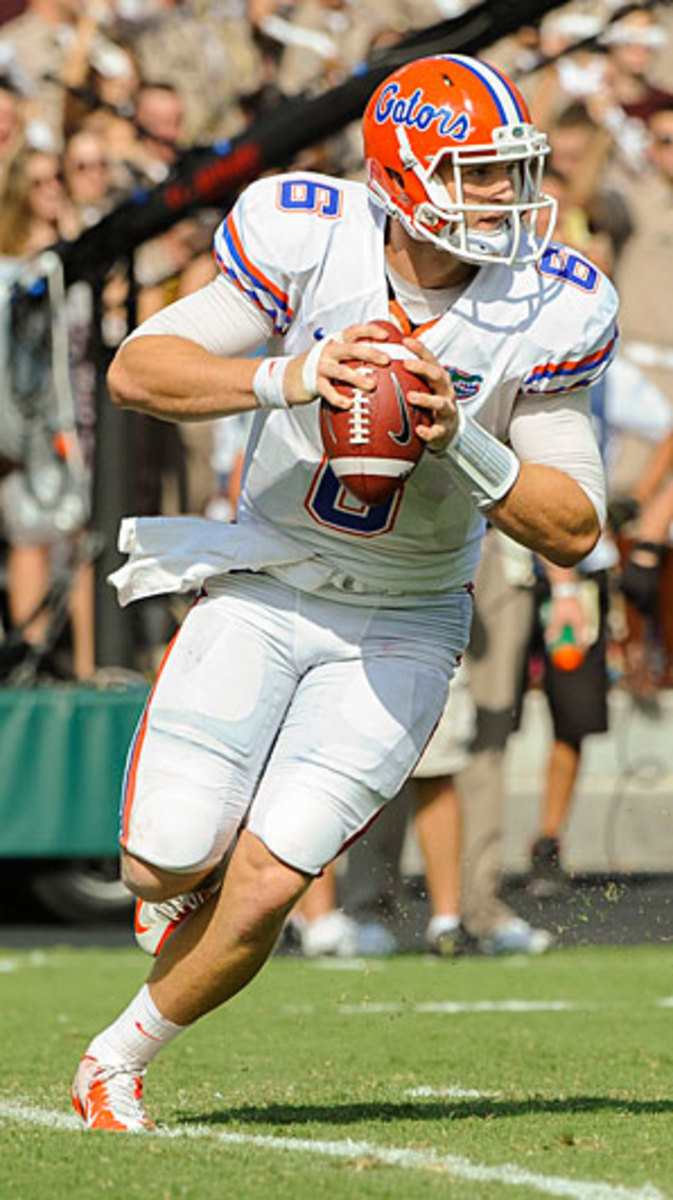Florida-Tennessee matchup pits two SEC programs at a crossroads
For those seeking further proof that the Florida-Tennessee series is in a strange place right now, consider this: The Knoxville Police Department issued stern warnings this week to any Tennessee fans considering storming the field at Neyland Stadium should the Volunteers beat Florida Saturday.
Storming the field? For beating a team that went 7-6 last year? The very idea seems offensive to anyone who remembers when this was the most important game in the SEC every year because these were the two best teams in the conference. From 1992-01, either Florida or Tennessee represented the Eastern Division in the SEC Championship Game. In all but two of those years (1992 and 1997), the team that won this game won the East. In all but three of those years (1992, 1999 and 2001), one of these teams went on to win the SEC.
For the first time since 2006, when freshman Tim Tebow announced his presence to the college football world with a critical fourth-down conversion, Florida-Tennessee feels like it means something. Not because these are the league's two best teams. Far from it. But because both programs seem to be at a crossroads.
Tennessee coach Derek Dooley inherited a dumpster fire after Lane Kiffin bolted for USC in January 2010. Dooley suffered through two awful seasons -- he lost to Kentucky in 2011, for goodness sakes -- but he has worked hard to rebuild the once-proud program and seems to have the Volunteers on the brink of SEC East contention. Florida coach Will Muschamp inherited a slightly better situation after Urban Meyer bolted for ESPN (then Ohio State), but Meyer left Muschamp with a painfully young team that lacked the personnel necessary for Muschamp to run his preferred offense. Now the Gators seem to be moving forward.
Here's the problem. Everyone in the SEC can't be great. Several programs have to be mediocre. Alabama and LSU dominate the West now, and Georgia and South Carolina dominate the East. The leaders at Tennessee and Florida do not accept mediocrity, so the Volunteers and Gators must climb over Georgia and South Carolina, or eventually they'll fire the coaches in charge and hire someone who can. To eventually reach the level of Georgia or South Carolina, either Tennessee or Florida must climb over the other. Only one will be in position to make an assault on the teams at the top, and that will be Saturday's winner.
The coaches must be careful not to let the players adopt that mindset, even if it's the truth. "I don't want us to be uptight," Dooley said on his call-in show Wednesday night. "I don't want them to go out there thinking it's the end of the world if we don't play well."
It won't be the end of the world, but the path back to relevance will grow that much steeper. For Tennessee, which hasn't beaten Florida since 2004, a loss would serve as a frustrating reminder of how far the Vols have fallen and how far they still must climb to become even the third-best program in the East. For the Gators, winners of three national titles since 1996, a loss would reinforce how low the program has sunk since Tebow's departure following the 2009 season. The competitive drought hasn't lasted nearly as long for Florida, but it remains unacceptable for one of the nation's most spoiled fan bases.
Each program seems in a far better place than it was in last year. Tennessee's offense has looked spectacular at times thanks to quarterback Tyler Bray and receivers Justin Hunter and Cordarelle Patterson. Meanwhile, the hiring of coordinator Sal Sunseri from Alabama has given the Vols a defense that beats up opposing receivers and dares quarterbacks to try to throw, all while posting a 6-7, 360-pound space eater (Daniel McCullers) in the middle of the line to discourage opponents from running.
Florida, meanwhile, has chosen a quarterback (Jeff Driskel) who can run and throw. This week, Driskel seemed confident he could train himself to stop holding onto the ball and taking the sacks that plagued him in his first start at Texas A&M. "Don't be scared to throw the ball away," Driskel said, "and live another day." Florida's defense, after looking porous against a Texas A&M offense it hadn't seen on film because the Aggies had yet to play a game under first-year coach Kevin Sumlin, locked down Texas A&M in the second half, allowing zero points and only 65 yards. Florida's defenders finally looked like the group everyone envisioned when Meyer hauled in a 2010 defensive class loaded with five-star players.
Muschamp bristles at the notion that those players have underachieved. He believes they are only now coming into their own. It's a sentiment Dooley, Muschamp's former co-worker at LSU under Nick Saban, probably shares. "It's not add water, instant player," Muschamp said. "I know we all think that because Rivals put 48 stars by their name, they're supposed to just be an outstanding football player the moment they walk on campus. It's not add water, instant player. It's not. It takes a process to become a good player."
The same could be said of rebuilding a program. Dooley has had a year longer than Muchamp, but patience with either coach will wear thin if he can't bring his program back to a summit that may be unreachable because some fairly excellent coaches and programs sit atop it at the moment. That isn't fair to either man, but that's reality. All Dooley and Muschamp can do is prepare their teams the best they can and try to convince the Volunteers and Gators they aren't playing a zero-sum game, even though they very well might be. "If we don't win," Dooley said, "the sky isn't going to fall."
It's only going to feel that way.






